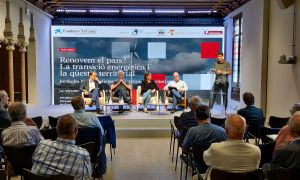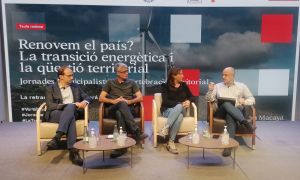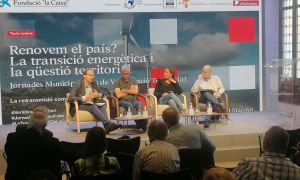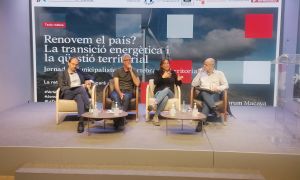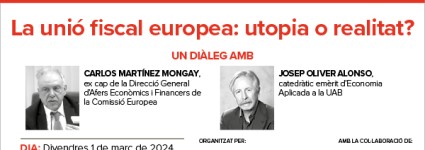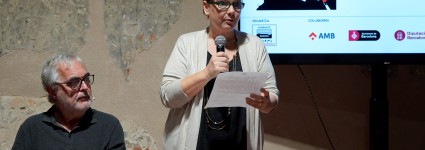"CATALONIA'S ENERGY DEPENDENCE IS EXTRAORDINARY, WE HAVEN'T BOARDED THE RENEWABLES TRAIN YET"
What challenges does the energy transition pose? How can we achieve them? How can we ensure that this transition is environmentally sustainable, socially just, economically viable and territorially balanced? These questions were the starting point of the debate "Renew the country? The energy transition and the territorial issue" held in the auditorium of CaixaForum Macaya in Barcelona, ??on Wednesday, October 5, 2022, as part of the cycle The transformation of the city
The objective of the round table was to reflect on the impact of the energy transition in the territory and open the debate to design actions towards a model that meets the demands of all social sectors.
The introduction and moderation of the round table was carried out by Joan López, member of the Energy, Territory and Society Studies Group (Gurb) of the UAB; and these were the speakers who participated:
- Sergi Saladié, professor in the Department of Geography at Rovira i Virgili University.
- Joan Herrera, director of Environmental Action and Energy at the Prat de Llobregat City Council
- Marta Morera, director of the Catalan Energy Institute (ICAEN) of the Generalitat de Catalunya.
"We are not in the tail wagon of the renewables train, but we still haven't got on."
In her speech, the director of the Catalan Energy Institute (ICAEN) of the Generalitat de Catalunya, Marta Morera, highlighted the importance of knowledge and studies such as "Energy Prospects of Catalonia". This document analyzes the new paradigm of the electricity sector and the transition towards a new energy model, where decentralized and distributed generation empowers citizens when it comes to defining new energy policies, which allow the goal of reaching 100 % of renewable energies in 2050 in Catalonia.
In this sense, she was convinced that the objectives can still be met if the public and private sectors work together; and gave optimistic data such as "in the last year, from 8 to 100 renewable energy projects have gone to public information (94 solar and 6 wind)". He also pointed out that "the occupation of the 2.5% of the territory needed for renewables can be done without affecting areas of agrological value and by defining priority areas for development".
For his part, the professor of the Department of Geography at Rovira i Virgili University, Sergi Saladié, described the situation in recent years in Catalonia as obvious improvisation due to the lack of planning and regretted that the Climate change law approved by the Parliament of Catalonia in 2017. "We have gone from a general regulatory framework to making projects, without first having a Plan. The current context has generated great legal uncertainty." At another point in the debate, he opted to "put the big renewable projects in the freezer" insisting on the impact of the big high voltage lines and the great difficulties of this model. Saladié advocated moving towards "connected self-sufficiency, because we will not do enough with roofs and self-generation of energy".
In fact, the situation in Catalonia, in terms of renewable energy, is still in its infancy, as the director of Environmental Action and Energy at the Prat de Llobregat City Council, Joan Herrera, showed with data. "Catalonia's energy dependence is extraordinary, we must bet on decarbonisation taking into account transport and industry demand. The production of renewables is very low, below the Spanish and European average", indicated Herrera. For this reason, he defended the need for a city-territory pact to tackle the energy transition in Catalonia quickly and in a coordinated way, since "today we are not at the tail end of the renewables train, but not yet we went up there."
The event began with the words of welcome from Jaume Lanaspa, president of the Club de Roma Office in Barcelona; Pau Mas, director of the Catalonia Europe Foundation; and Josep Báguena, president of the Catalan Land Planning Society (SCOT).
Below you can read the article from the session written by the moderator Joan López, member of the Energy, Territory and Society Study Group (Gurb) of the UAB.
The transformation of the city is a cycle of debates organized by the Fundación Catalunya Europa with the Fundación La Caixa and the Club of Rome and the Sociedad Catalana de Ordenación del Territorio, which receives the support of the AMB, the Diputación de Barcelona, and the city councils of Barcelona, Santa Coloma de Gramanet, Gavà and Sant Cugat del Vallès.


